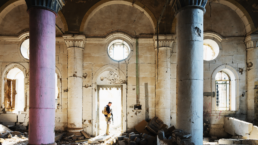The US’s deadly drone strikes have faded from the headlines. But in the Libyan village of Ubari, family members of the victims of a 2018 strike are still enraged at the indiscriminate killing and seeking justice for their loved ones.
By Nick Turse, Jacobin
Madogaz Musa Abdullah still remembers the phone call. But what came next was a blur. He drove for hours, deep into the Libyan desert, speeding toward the border with Algeria. His mind buckled, his thoughts reeled, and more than three years later, he’s still not certain how he made that six-hour journey.
The call was about his younger brother, Nasser, who, as he told me, was more than a sibling to him. He was also a close friend. Nasser was polite and caring. He loved music, sang, and played the guitar. Jimi Hendrix, Carlos Santana, and Bob Marley were his favorites.

Abdullah finally found Nasser near the village of Al Awaynat. Or, rather, he found all that remained of him. Nasser and ten others from their village of Ubari had been riding in three SUVs that were now burnt-out hunks of metal. The eleven men had been incinerated. Abdullah knew one of those charred corpses was his brother, but he was at a loss to identify which one.
Recent Posts
‘Unconstitutional. Unethical. Authoritarian.’ ICE Bars Millions Of Immigrants From Bond Hearings
July 18, 2025
Take Action Now One watchdog said the new policy “seems like a blatant attempt to stop them from exercising their right to due process.”……
Americans Are Not Nearly Alarmed Enough About Climate Change
July 18, 2025
Take Action Now Americans still don’t comprehend how imminent, dangerous, and far-reaching the threat is—and journalists are partly to blame.By…
The IRS Is Building A Vast System To Share Millions Of Taxpayers’ Data With ICE
July 17, 2025
Take Action Now ProPublica has obtained the blueprint for the Trump administration’s unprecedented plan to turn over IRS records to Homeland Security…
Israel’s Sudden Assault On Syria Is Unchecked Aggression
July 17, 2025
Take Action Now Jerusalem is bombing Damascus and threatening al-Sharaa’s rule, while Washington was hoping to help the nascent government on…




